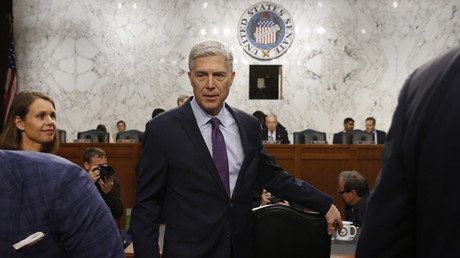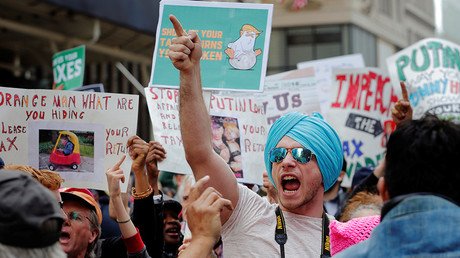Lone congressman calls to impeach Trump on House Floor: Does it matter?
Representative Al Green (D-Texas) has called for impeachment proceedings to begin against President Donald Trump. His speech on the House Floor came as a group of Democrats distanced themselves from calls for impeachment.
“I rise today with a heavy heart,” Green began. “I rise today with a sense of responsibility and duty to the people who have elected me, a sense of duty to this country, a sense of duty to the Constitution of the United States of America. I rise today, Mr. Speaker, to call for the impeachment of the president of the United States of America for obstruction of justice.”
CLIP: @RepAlGreen: "I rise today...to call for the impeachment of the President of the United States of America for obstruction of justice." pic.twitter.com/k3OMGcZbEF
— CSPAN (@cspan) May 17, 2017
His call for impeachment was “not for political purposes,” Green said. “I do this because, Mr. Speaker, there is a belief in this country that no one is above the law, and that includes the president.”
Impeachment is a three-part process outlined in the Constitution. It begins in the House of Representatives, where a simple majority can vote to impeach a federal official for "treason, bribery, or other high crimes and misdemeanors." The definition is vague and has long been debated. In 1970, then-House Minority Leader Gerald Ford defined an impeachable offense as “whatever a majority of the House of Representatives considers it to be at a given moment in history."
Once the House has voted to impeach, the issue heads to the Senate, which holds a trial. If the official in question is the president, then the chief justice of the US Supreme Court is the presiding judge, otherwise it is the vice president in his role as president of the Senate. The Senate needs a two-thirds majority, or 67 out of 100 votes, to find an official guilty and remove that person from office.
Green’s speech on Wednesday morning came as Democratic leadership in the House held a press conference calling for an open-ended, independent investigation into any potential criminal wrongdoings by Trump and his associates.
“It seems like we are learning disturbing new allegations about President Trump not just every day, but every hour,” said Rep. Elijah Cummings (D-Maryland), the ranking member on the House Oversight Committee. “Our committee should already be conducting robust and transparent investigations.”
He faulted House Republicans, specifically Speaker of the House Paul Ryan (R-Wisconsin) and Oversight Committee Chair Jason Chaffetz (R-Utah), for doing “as little as humanly possible just to claim that they’re doing something.”
Under a bill proposed by Rep. Eric Swalwell (D-California), Congress would create an independent, bipartisan commission of 12 people to investigate alleged Russian meddling into the 2016 presidential election, any collusion with the Trump campaign and accusations by former FBI Director James Comey, whom Trump abruptly fired last Tuesday, that the president urged Comey to drop a probe into Michael Flynn, Trump’s disgraced former national security adviser.
“Our democracy is a mess,” Swalwell said. “Today is a courage call for our Republican colleagues. Can they put party aside and unite with Democrats?”
READ MORE: House Oversight Chairman ‘ready to subpoena’ Trump over reporting of Comey communications
The Democratic minority in the House stopped short, however, of calling for articles of impeachment, although House Democratic Caucus Chair Joseph Crowley (D-New York) noted that “members can come to their own conclusions” about whether the president should be impeached.
Rep. Adam Schiff (D-California), the ranking member of the House Intelligence Committee, warned that any steps must be bipartisan, and that hasty talk of impeachment would become a distraction.
“It cannot be perceived as an effort to nullify the election by other means,” he said.
Only two presidents ‒ Andrew Johnson in 1868 and Bill Clinton in 1999 ‒ have ever been impeached by the House, both of which history has judged to be highly partisan proceedings. Neither was convicted in the Senate. President Richard Nixon resigned in 1974, rather than go through an impeachment vote in the House.
“We are at a very significant moment in this country’s history,” Cummings said. “We need to get this right,” no matter how long it takes because “this is bigger than us, this is bigger than President Trump. This is about the soul of our democracy.”
As Trump’s approval ratings have dropped, Republicans are hearing from their constituents that they need to do more when it comes to investigating the president, CNN reported. Only 42 percent of Americans approve of Trump, according to a new Politico/Morning Consult poll released Wednesday. It was conducted after the Comey firing but before news broke of his memo or that Trump may have disclosed classified information from an ally to Russia.
This is the highest disapproval rating we've measured for Trump so far, and close to his lowest approval rating. https://t.co/XxvWwyPbMcpic.twitter.com/giHYiWryXJ
— Nate Silver (@NateSilver538) May 16, 2017
So far, only one GOP representative has publicly said that impeachment may be an option. Rep. Justin Amash (R-Michigan), a member of the conservative House Freedom Caucus and a frequent Trump critic, said that, if it turns out that Trump pressured Comey to drop the Flynn investigation, it would be grounds for impeachment, The Hill reported.
"But everybody gets a fair trial in this country," Amash told reporters as he left a House GOP conference meeting. When asked if he trusted Comey’s word over Trump’s, he replied: "I think it's pretty clear I have more confidence in Director Comey."















